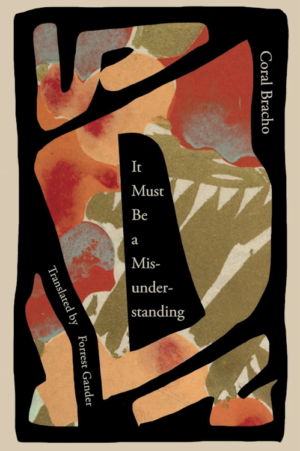It Must Be a Misunderstanding
by Coral Bracho, translated by Forrest Gander
reviewed by Constance Hansen
Coral Bracho is a poet and translator from Mexico City. Awarded the Xavier Villaurrutia Award for Ese espacio, ese jardín (2003), she is the richly acclaimed author of six additional titles. Forrest Gander, the translator of her latest book, It Must Be a Misunderstanding, previously translated her selected poems Firefly Under the Tongue (2008) into English.
It Must Be a Misunderstanding is a collection of poems that attend to Bracho’s late mother’s experience with Alzheimer’s disease. The beginning of the opening poem blazes with the power of an invocation: “By means of what song, what bird, / do you shoot through me like a flame, a thin / fiber?” This gently interrogative tone of wonder is sustained throughout, despite the painful subject matter, and Forrest Gander’s lyrical translations transmit the music in the lines.
The book is broken into nine parts and the first eight begin with long, sectioned, surrealist poems, inspired by observed hallucinations and misunderstandings. The accompanying poems in each section go by titles such as “Observations,” “Intuitions,” “Impressions,” and “Diary” and they shine the light of the speaker’s mind on the chaotic predicament of memory loss. These shape-shifting poems embody the variable moods of the mother, from restless paranoia to confused anger to ecstatic appreciation:
How old am I?
Whatever age you say—
Who could be happier than I am
doing everything
I love most: dancing,
singing?
Later in the book, we are shown the mother reacting joyfully to music, but only for an instant before she is drawn back into the black box of her disease. Form mirrors content in this work, as the tragic, inexorable progress of Alzheimer’s disease is reiterated through the sequencing of the poems.
Doctors and caregivers form an ensemble around the mother and daughter, creating a chorus of voices. There’s a fluidity to the speakers that suits the subject yet also arises from translation, as Gander explains in the translator’s foreword:
It’s typical in translations from Spanish to English that ambiguities derived from nonspecific pronouns often need to be rendered more specifically. [ … ] In poems that take place in a facility where people are literally losing their minds, mistaking identities, and experiencing hallucinations, the ambiguity of pronouns in Spanish can take on the legerdemainish drama of three-card monte.
Beings and objects become increasingly unmoored from their context and history over the course of Alzheimer’s disease, and Bracho replicates this phenomenon through the decontextualization of nouns and the quilting together of unexpected images:
The light moves like a current
or skein of threads.
There’s a wooden boat, a small plane,
and the current rocks them now and then.
Inside, there’s a crab.
There’s also a heart.
In the same twelve-section poem, Bracho enacts the syntax of dementia’s interruptions: “She approaches me wanting to tell me / that I. And then she stops telling me.” In yet another section, the element of surprise sparkles, but not without acknowledging the awful isolation of dementia:
[ … ] right in the middle of what I want to say
there’s a long row of chairs. There are green,
red, yellow arches that gradually contract
and close, like doors.
Like a disease whose threshold no one can cross,
she says.
Yet a will to connect troubles the threshold. Music and imagination may cross, and if these elements of poetry might, might not poetry? This is the empathetic goal that beats at the heart of It Must Be a Misunderstanding.
This longing to understand the patient’s obfuscated state of consciousness is bolstered by intimate intuition as much as by reason:
Which thread is the one that tells our story
and lends us substance
when there’s no trajectory
by which to make sense of ourselves?
Which thread are we sure is vital?
The one that, maybe, ties together the handful of gestures
that comprise us; so we feel
we still have control. Gestures
that we repeat as certainties; that delineate
those certainties which once shaped us
and which now delimit
and nail us
to our shadows.
This is a book with as much depth of soul as scope of craft. It may be appreciated as a contribution to the philosophy of consciousness, an elevation of language’s possibilities, or as a worthy tribute to a deceased beloved. It Must Be a Misunderstanding has an aura of compassion, curiosity, and tenderness that readers will find evocative and nutritive at the same time.
Published on February 7, 2023

